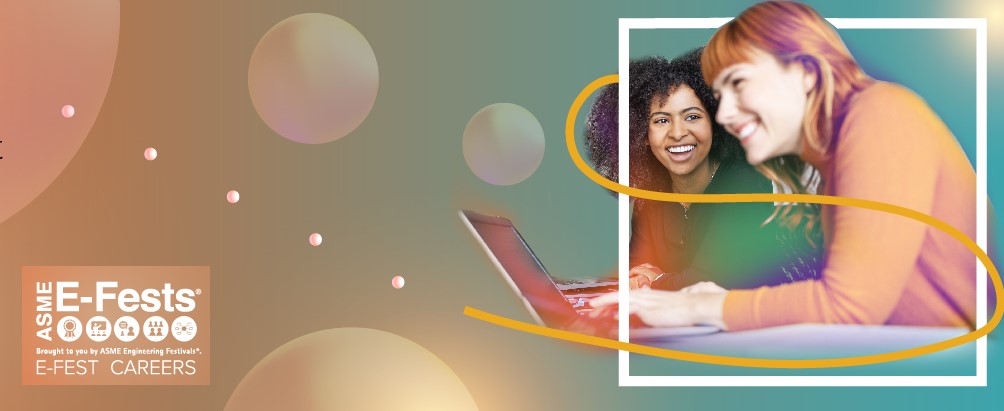E-Fest Careers: Engineering in a Changing Climate
E-Fest Careers: Engineering in a Changing Climate


Thousands of students and early career engineers attended the virtual September ASME event, E-Fest Careers. Topics included the global need to decarbonize, mechanical engineers’ place in fueling growth using sustainable approaches, and the overall big picture on ME’s work toward net zero.
The day’s keynote speakers discussed "Engineering an Impact on Sustainability," which included a look at the big picture on net zero. It’s important to understand the sources of emissions and nature’s means of rebalancing the climate system, explained Amanda Smith, senior scientist for the Built Environment, Project Drawdown. “We are adding stuff to the atmosphere,” she said plainly. Land and water remove about 40 percent of human-made emissions and help us out in that regard, “but most stays in the atmosphere,” Smith concluded.
The ability to achieve drawdown—the point when levels of greenhouse gases in the atmosphere stop climbing and start declining—centers on a solution with three areas of focus, her project explained. First, is reduce from the source, next is to support “sinks,” and finally to improve society to avoid climate catastrophe.
Smith called for up-to-date methods for halting emissions before they reach the atmosphere from electricity, food, industry, transportation, and buildings. Another idea is supporting sinks. This strategy includes changing agriculture practices and addressing human diets to restore ecosystems. Smith also addressed the critical importance of centering human equality in the race to shift climate solutions to global action.
Mechanical engineering and the role they take in sustainability took center stage in the session, “Mechanical Engineering Impact & Contributions Towards Sustainable Development.” Anil Kumar, assistant general manager, Astec Valves & Fittings India, offered a global sustainability overview as well as potential areas where MEs can and have taken the lead in finding viable solutions. He listed—among many areas--material selection for service equipment, solar energy efficiency, and an optimization approach to utilize resources efficiently.
Kumar covered specific areas where MEs can have influence. These are big areas of importance, from clean water and sanitation to affordable clean energy. But there are specific sections that cannot move forward without innovation, he said as he looked at sustainable cities and communities. With the mechanical agent contribution as a focus, Kumar called out an “optimization approach,” this means the design is efficient and has less of a carbon footprint which can only happen at the initial stages.
Kumar talked about a collaborative approach that included such upcoming technologies as hydrogen where MEs can begin to face challenges like transporting gas and storing it—both efficiently and safely. Specifically MEs understand such challenges as materials and structural integrity, for example.
Interested in making a difference, while putting your mechanical engineering skills to the test? Participate in the ASME Extended Reality Challenge (XRC): Sustainability Innovations Ocean Clean-up virtual competition, taking place at E-Fest Digital on March 16, 2024. Sponsored by Autodesk, this competition provides an opportunity for students and early career engineers to apply four (4) online learning modules into a virtual reality competition with a focus on Industry 4.0 skills while learning about sustainability and current global issues.
Download the XRC: Sustainability Innovations Competition Rules
Or view all of our student competition rules
Interested in more professional development resources? Check out our upcoming Career Webinars:
Mastering the Most Common Interview Questions
Nov 06, 2023 - 1:30 PM
Sign Up
Goal Setting the Right Way for Engineering Professionals
Dec 04, 2023 - 1:30 PM
Sign Up
The day’s keynote speakers discussed "Engineering an Impact on Sustainability," which included a look at the big picture on net zero. It’s important to understand the sources of emissions and nature’s means of rebalancing the climate system, explained Amanda Smith, senior scientist for the Built Environment, Project Drawdown. “We are adding stuff to the atmosphere,” she said plainly. Land and water remove about 40 percent of human-made emissions and help us out in that regard, “but most stays in the atmosphere,” Smith concluded.
The ability to achieve drawdown—the point when levels of greenhouse gases in the atmosphere stop climbing and start declining—centers on a solution with three areas of focus, her project explained. First, is reduce from the source, next is to support “sinks,” and finally to improve society to avoid climate catastrophe.
Smith called for up-to-date methods for halting emissions before they reach the atmosphere from electricity, food, industry, transportation, and buildings. Another idea is supporting sinks. This strategy includes changing agriculture practices and addressing human diets to restore ecosystems. Smith also addressed the critical importance of centering human equality in the race to shift climate solutions to global action.
Mechanical engineering and the role they take in sustainability took center stage in the session, “Mechanical Engineering Impact & Contributions Towards Sustainable Development.” Anil Kumar, assistant general manager, Astec Valves & Fittings India, offered a global sustainability overview as well as potential areas where MEs can and have taken the lead in finding viable solutions. He listed—among many areas--material selection for service equipment, solar energy efficiency, and an optimization approach to utilize resources efficiently.
Kumar covered specific areas where MEs can have influence. These are big areas of importance, from clean water and sanitation to affordable clean energy. But there are specific sections that cannot move forward without innovation, he said as he looked at sustainable cities and communities. With the mechanical agent contribution as a focus, Kumar called out an “optimization approach,” this means the design is efficient and has less of a carbon footprint which can only happen at the initial stages.
Kumar talked about a collaborative approach that included such upcoming technologies as hydrogen where MEs can begin to face challenges like transporting gas and storing it—both efficiently and safely. Specifically MEs understand such challenges as materials and structural integrity, for example.
Interested in making a difference, while putting your mechanical engineering skills to the test? Participate in the ASME Extended Reality Challenge (XRC): Sustainability Innovations Ocean Clean-up virtual competition, taking place at E-Fest Digital on March 16, 2024. Sponsored by Autodesk, this competition provides an opportunity for students and early career engineers to apply four (4) online learning modules into a virtual reality competition with a focus on Industry 4.0 skills while learning about sustainability and current global issues.
Download the XRC: Sustainability Innovations Competition Rules
Or view all of our student competition rules
Interested in more professional development resources? Check out our upcoming Career Webinars:
Mastering the Most Common Interview Questions
Nov 06, 2023 - 1:30 PM
Sign Up
Goal Setting the Right Way for Engineering Professionals
Dec 04, 2023 - 1:30 PM
Sign Up





